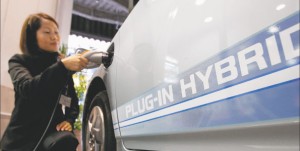 Like hunters on the prowl, entrepreneurs are always on the look out to pounce on market opportunities.
Like hunters on the prowl, entrepreneurs are always on the look out to pounce on market opportunities.
Every June, Finance ministers, in their Budget speeches, often present entrepreneurs with market opportunities either through increased budgetary allocation for certain sectors or waiving duty on certain imports making them cheaper.
It was no different this year.
Finance minister Uhuru Kenyatta — in his 2011/2012 Budget speech — opened investment doors for the growing breed of entrepreneurs who import and sell vehicles by exempting duty on battery operated vehicles.
“We need to encourage usage of environmentally-friendly vehicles to reduce carbon emission and noise pollution,” said Mr Kenyatta in one of the measures encouraging use of green energy. “In this regard battery operated vehicles will be duty exempt.”
Duty usually accounts for a significant portion of the vehicles landing cost with most entrepreneurs in the car import business who spoke to the Business Daily saying the rates are based on the cars depreciation calculated by the Kenya Revenue Authority officials.
The market for new and second hand cars has been growing – driven mostly by Kenya’s growing middle class — as sales have grown steadily since crossing the 100,000 new registrations per year in 2008, according to statistics from the Kenya National Bureau of Statistics.
Entrepreneurs have been quick to tap into the growing demand; the numerous car sales yards along some of Nairobi’s busy highways attest to this.
With battery operated vehicles being exempt from duty, the question is whether there really is a market for them in the country.
Vehicles which operate solely on battery will require points or stations where the batteries can be charged or replaced as it happens in the developed countries.
Then there is the concern about the country’s road network with the growing traffic jams and poor road networks which will increase the cost of operating a battery powered vehicle.
But analysts say the government’s plans to spend Sh100.9 billion, nearly half the total budget for physical infrastructure for the period, to develop the country’s road network is likely to ease transport hurdles and make it easy for Kenyans to use battery-powered cars. Whether car dealers will start bringing in these battery-powered cars. Some entrepreneurs say they have to weigh the market appetite before they consider shipping them in.
The market is tricky and so it is important to get your target customers right.
“I will need to do my research first,” said Peter Ngacha, an importer of second hand vehicles, adding the cost of battery powered vehicles means it is mostly the affluent who will be able to afford them. “You do not want to bring in a car which stalls in the show room,” he said, giving an example of the hybrid Toyota Harrier – which runs on both fuel and battery – and sales at a higher price of Sh4 million whereas the similar model which costs Sh2 million.
If the Toyota hybrid was exempt from duty it means the cost would drop.
Though, Mr Kenyatta—the Finance minister—did not specify if only vehicles running on batteries or together with the hybrid vehicles would be exempt from duty.
A number of dealers said vehicles running solely on batteries are rare whereas the hybrid cars are more common.
Real demand
But Mr Ngacha says the real demand is in “affordable” cars such as the Toyotas, Mitsubishis, Nissans, Subarus and other models whose prices range at Sh700,000 to Sh800, 000.
“People have become very Toyotarised but the Mitsubishi and Nissans have become affordable and are doing well in the market,” he said.
Analysts who track the performance of the larger car dealers such as the Nairobi Stock Exchange (NSE) listed car dealer CMC are of the opinion that the tone has to be set first by the bigger players.
“The trail has to be blazed by the big companies before the smaller players follow,” said Johnson Nderi who tracks automotive stocks for Suntra Investment Bank at the NSE, saying the capital outlay might be substantive locking out smaller players.
Source:
